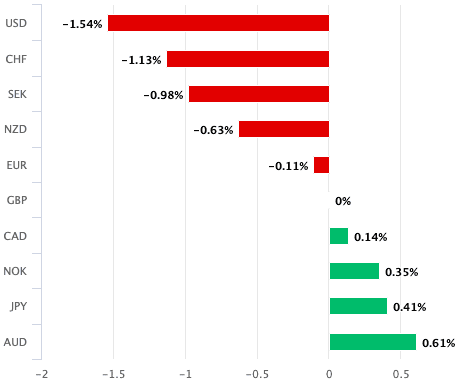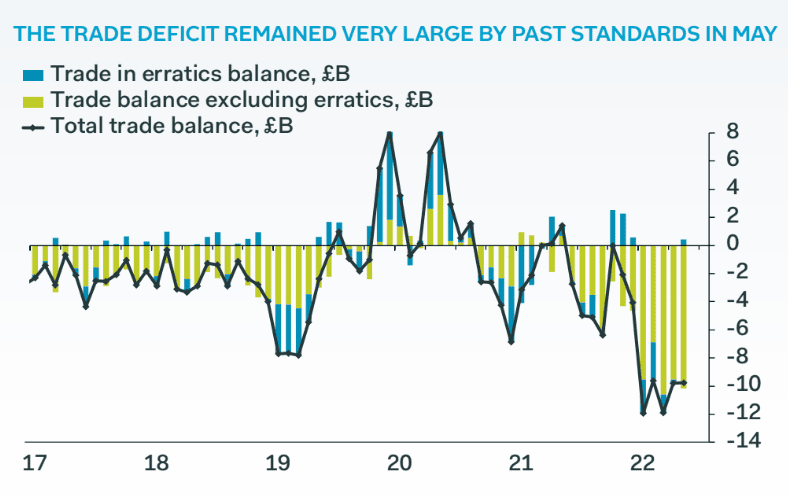Pound Sterling Remains Vulnerable against Euro and Dollar
- Written by: Gary Howes

Image © Adobe Images
The British Pound steadied ahead of the weekend amidst settling global market conditions but is still looking to record a weekly loss against the Dollar and record a third successive weekly decline.
The Pound is also looking to record a weekly loss against the Euro and both European currencies remain under the hammer against their U.S. rival owing to fears surging gas prices in the region will push the UK and Eurozone into economic malaise.
It looks unlikely the European duo will overturn this week's loss against the Dollar given the light economic and event calendar on Friday, but a positive day of trade in global equities could offer some support.
The Pound to Dollar exchange rate is down 1.65% this week at 1.1829, the Pound to Euro exchange rate is lower by a marginal 0.10% on the week at 1.1798. (Set your FX rate alert here).
Stock markets turned higher and the Dollar retreated into Friday as expectations for a 100 basis point Federal Reserve hike later in July faded.
Fed governor Christopher Waller prompted the lowering of Fed rate hike expectations after he said he preferred a 75bp hike and was not yet ready to go with the 100bp hike the markets scrambled to price in after Wednesday's CPI report.
Markets overturned losses and the Dollar decline in the wake of the comments.
Compare Currency Exchange Rates
Find out how much you could save on your international transfer
Estimated saving compared to high street banks:
£2,500.00
Free • No obligation • Takes 2 minutes
Market bets for a 100bp hike had risen sharply after Wednesday's inflation data release and after other Fed governors suggested they were open to raising interest rates more aggressively.
This would push the cost of borrowing up sharply and induce an economic slowdown, not just in the U.S. but globally given the centrality of the U.S. economy and its currency.
But Waller's comments would suggest such a blistering rate hike is not yet a done deal, allowing markets to express some relief.
What the Federal Reserve does matters for the Bank of England and the Pound: rapid rate hikes at the Fed would mean the Bank has to try and keep up to defend the value of the Pound which has already fallen 12.50% this year.
Money markets suggest Bank Rate will peak just above 3% around year-end, meaning it will unlikely ever close the gap on the Fed.
This differential should keep pressure on the Pound relative to the Dollar.

Above: GBP performance this past week.
The Pound-Euro exchange rate remains evenly poised near current levels with this week's price action confirming both European currencies offer little differentiation from each other.
For the Euro's part, politics might meanwhile be of concern over coming days given the attempted resignation Thursday of Italy's Prime Minister Mario Draghi.
"The greenback came off its highs following comments from Fed Waller. EUR/USD saw a brief move back below parity when Italian PM Mario Draghi offered his resignation, which President Sergio Mattarella subsequently refused to accept," says analyst Quek Ser Leang at UOB.
The Italian political uncertainty comes amidst a time of rising Italian debt costs, which could complicate the European Central Bank's plans to raise interest rates over coming months.
Any decline in ECB rate hike expectations would drag on Euro exchange rates, potentially offering the Pound-Euro a route higher.
Look for Italian politics and the ECB's meeting next Thursday to dominate near-term interest.
GBP to USD Transfer Savings Calculator
How much are you sending from pounds to dollars?
Your potential USD savings on this GBP transfer:
$1,702
By using specialist providers vs high street banks
Positive GBP Developments
UK GDP was unexpectedly higher in May, surprising investors and analysts right across the board and offering Sterling a boost when released midweek.
In fact, Goldman Sachs upgraded their UK GDP forecasts to the extent they say it is now unlikely the UK will suffer recession.
This week the Bank of England Governor Andrew Bailey also confirmed the Bank will take the necessary action to bring inflation down; the market read this as another signal a 50bp rate hike is coming this August and more robust signalling will ensue.
A 50bp hike now looks to be the bare minimum the Bank must deliver in August if Sterling is to avoid a major selloff.
Politics is meanwhile set to calm down, with Prime Minister Boris Johnson holding the reins until September when a new leader will be installed.
All candidates are erring towards tax cuts and, for foreign exchange markets, the less noise out of UK politics all the better for Sterling.
Negative GBP Developments
The Pound remains a pro-cyclical, high-beta currency, it tends to decline against the Dollar, Yen, Franc and usually the Euro when global stock markets are in decline.
We are in a bear market and this could be the case for another two to three years according to one analysis.
Until the Fed signals it is ready to slow down its pace of rate hikes the outlook will remain challenging.
The UK also has a sizeable trade deficit that creates a fundamental drag on the Pound.
Gabriella Dickens, Senior U.K. Economist at Pantheon Macroeconomics said this week Pound Sterling will remain "vulnerable" due to the country's "colossal trade deficit".
Image courtesy of Pantheon Macroeconomics.
"The U.K. trade deficit remained giant by historical standards in May," said Dickens, citing a surge in imports of goods and the inability of exports to keep pace.
This makes sense to a degree: the economy is reopening following the Covid shutdowns and supply chains are improving, making imports more readily available.
But, global demand for UK exports remains constrained, particularly in China which has seen an import implosion owing to its ongoing zero-Covid approach.
As a share of GDP, Pantheon Macroeconomics expect the deficit to reach 4%—the largest since 1974, "underlining the vulnerability of sterling," says Dickens.
GBP to USD Transfer Savings Calculator
How much are you sending from pounds to dollars?
Your potential USD savings on this GBP transfer:
$1,702
By using specialist providers vs high street banks





